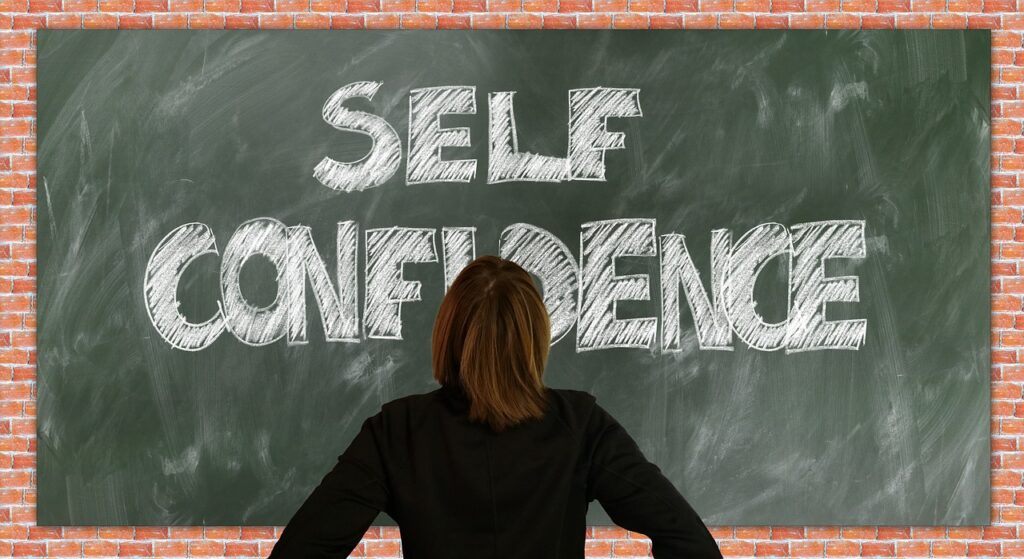Self-confidence is the trust in your abilities, qualities, and judgment. It plays a crucial role in how you approach challenges, interact with others, and handle stress. High self-confidence can lead to improved performance, resilience, and overall well-being.
Components of Self-Confidence
- Self-Efficacy: Belief in your ability to succeed in specific situations or tasks.
- Self-Acceptance: Acknowledging your strengths and weaknesses without harsh self-judgment.
- Positive Outlook: Maintaining an optimistic perspective about your abilities and future possibilities.
What Are Signs Of Lack Of Self-Confidence?
Signs of low self-confidence can manifest in various ways, impacting thoughts, behaviors, and interactions. Here are some common indicators:
Emotional Signs
- Self-Doubt: Frequently questioning your abilities and decisions.
- Anxiety in Social Situations: Feeling nervous or uncomfortable in social settings or when meeting new people.
- Fear of Judgment: Worrying excessively about what others think of you.
Behavioral Signs
- Avoidance of Challenges: Steering clear of new opportunities or risks due to fear of failure.
- Over-Apologizing: Apologizing excessively, even when it’s unnecessary.
- People-Pleasing: Going out of your way to gain approval from others, often at the cost of your own needs.
Cognitive Signs
- Negative Self-Talk: Engaging in critical thoughts about yourself or your abilities.
- Comparing Yourself to Others: Constantly measuring your worth against others and feeling inferior.
Physical Signs
- Poor Body Language: Slouching, avoiding eye contact, or fidgeting during conversations.
- Nervous Habits: Exhibiting signs of nervousness, such as biting nails or pacing.
Interpersonal Signs
- Difficulty Asserting Yourself: Struggling to express your opinions or needs in discussions.
- Fear of Conflict: Avoiding disagreements or conversations that might lead to confrontation.
Motivation Signs
- Procrastination: Delaying tasks due to fear of not performing well.
- Lack of Initiative: Hesitating to take action or make decisions, often waiting for others to lead.
Recognizing these signs can help you understand the impact of low self-confidence on your life and motivate you to take steps toward improvement. If you identify with several of these signs, consider exploring strategies to build your confidence or seeking support from a professional.
How To Build Self Confidence?
Building Self-Confidence: Detailed Steps
- Set Achievable Goals:
- Start Small: Set realistic, manageable goals that can be achieved in a short time.
- Progressive Challenges: Gradually increase the difficulty of your goals as you achieve smaller ones.
- Identify Strengths and Skills:
- Self-Assessment: Make a list of your strengths, talents, and skills. Focus on what you do well.
- Seek Feedback: Seek feedback from trusted friends or colleagues about your strengths.
- Embrace New Experiences:
- Step Out of Your Comfort Zone: Try new activities or challenges that can help you grow.
- Learn from Mistakes: View failures as learning opportunities rather than setbacks.
- Positive Self-Talk:
- Challenge Negative Thoughts: Identify and replace self-critical thoughts with positive affirmations.
- Daily Affirmations: Practice affirmations that reinforce your abilities and worth.
- Visualize Success:
- Imagery Techniques: Spend time visualizing yourself succeeding in your goals or overcoming challenges.
- Positive Imagery: Picture yourself in a confident state during important events, like public speaking.
- Practice Assertiveness:
- Communicate Clearly: Express your thoughts, feelings, and needs respectfully and confidently.
- Stand Up for Yourself: Learn to say no and set boundaries when necessary.
- Develop Competence:
- Skill Building: Invest time in learning and improving skills related to your interests or profession.
- Seek Training: Take courses, attend workshops, or read books to expand your knowledge.
- Maintain a Healthy Lifestyle:
- Regular Exercise: Physical activity boosts mood and self-esteem.
- Healthy Eating and Sleep: Proper nutrition and rest contribute to overall well-being.
- Surround Yourself with Positive Influences:
- Supportive Relationships: Spend time with people who uplift and encourage you.
- Limit Negative Interactions: Distance yourself from individuals who bring you down or are overly critical.
- Celebrate Achievements:
- Acknowledge Successes: Celebrate both small and large accomplishments.
- Reward Yourself: Treat yourself for achieving goals to reinforce positive behavior.
- Seek Professional Help:
- Counseling or Coaching: A professional can provide personalized strategies and support for building confidence.
Conclusion
Building self-confidence is a continuous process that involves self-reflection, skill development, and positive reinforcement. By taking proactive steps, you can cultivate a stronger belief in your abilities and improve your overall quality of life.



